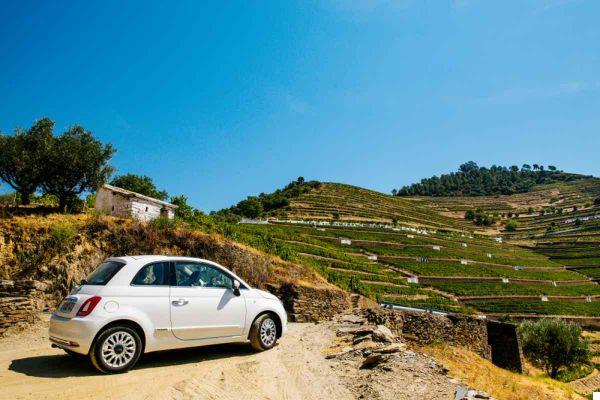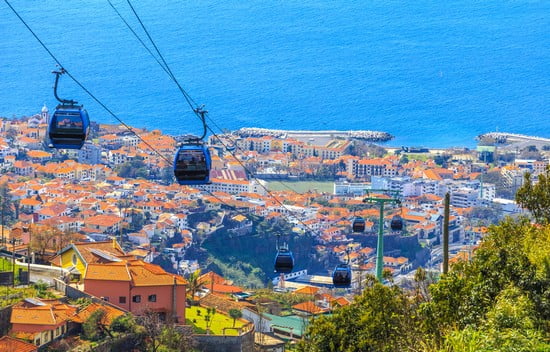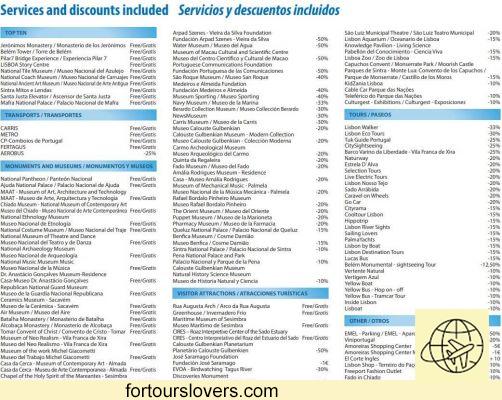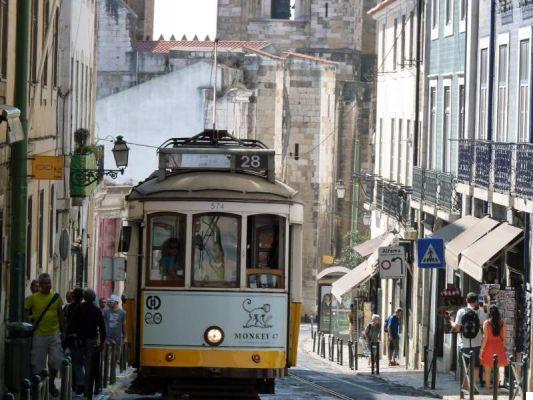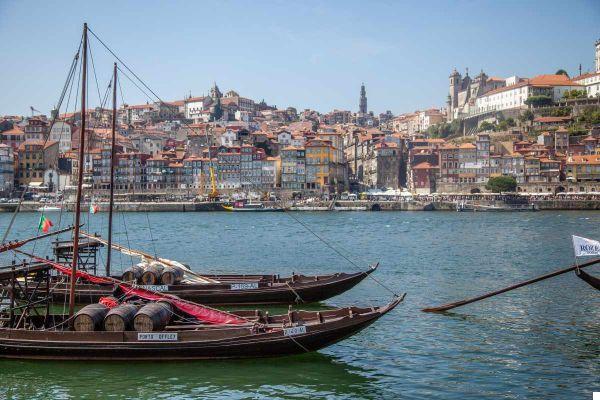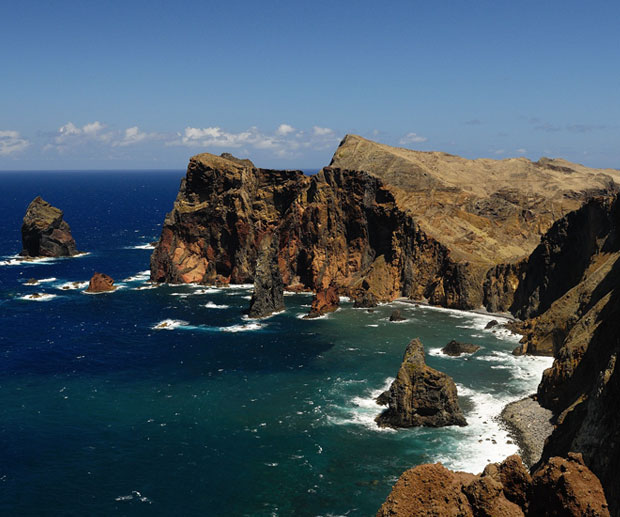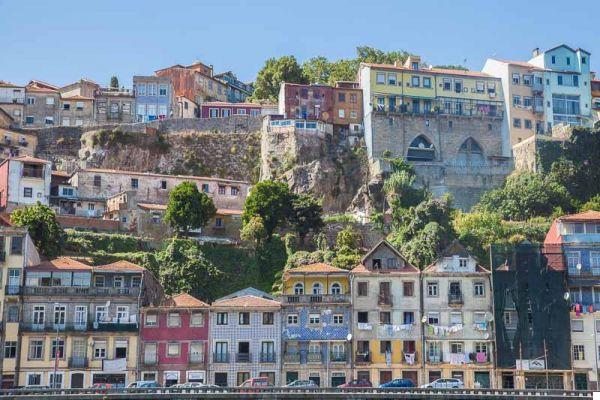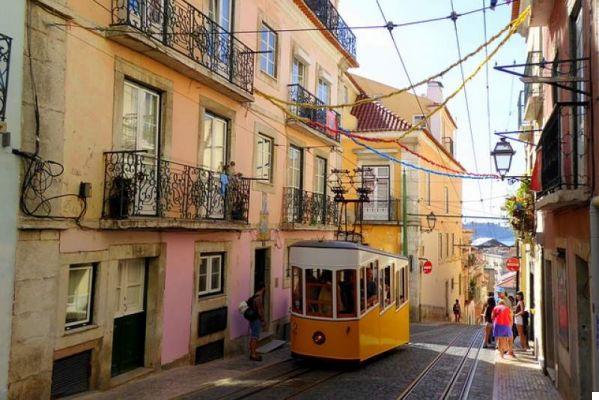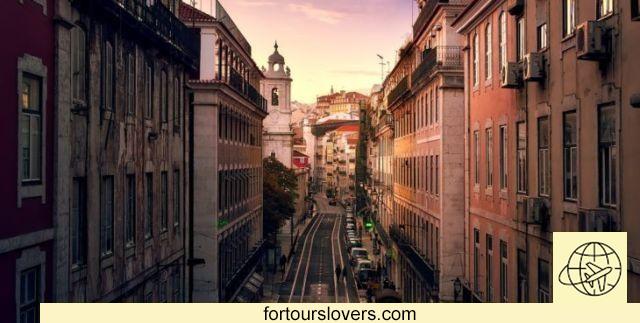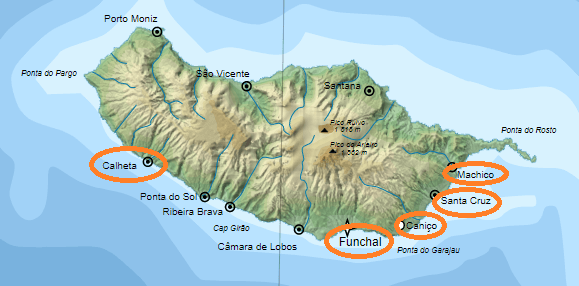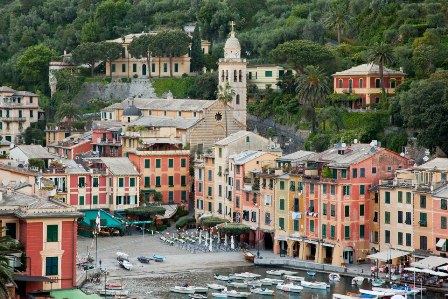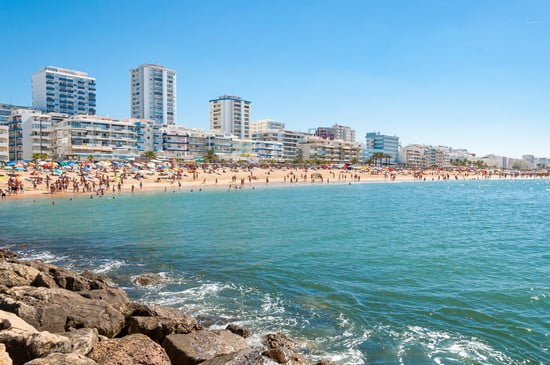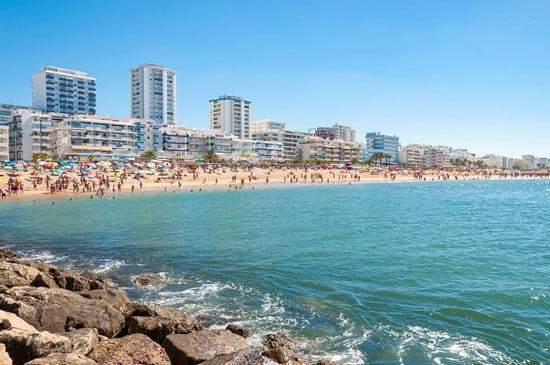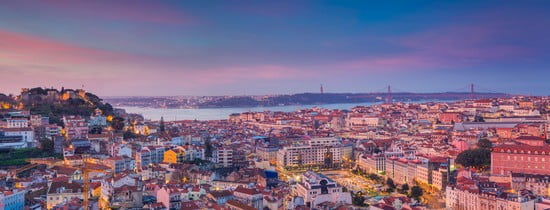Renting a car in Portugal is a great idea!
In recent years, Portugal has been on everyone's must-see list.
No surprise. It is a beautiful country, the people are friendly and compared to other countries in Europe (including ours) the prices are lower.
Personally I loved both Lisbon (which for me is one of the most beautiful capitals) and Porto, but I think that much of the charm of the Portugal on the road or traveling aimlessly among its vineyards, olive groves and villages that date back to the Middle Ages, not to mention the wonderful coasts of the Alentejo or the Algarve which are even better when traveled with your car.
these useful tips for car rental they will help you save money and avoid having nasty surprises like extra costs when you rent a car in Portugal.
There are car rental offices in all major Portuguese airports and cities, but don't wait to get here to rent a car - it will always cost more than booking in advance.
So if you are thinking of rent a car in Portugal stop for a second and read this article, in which I will try to give you a series of tips to save and avoid extra costs!
COMPARE RATES
Here for you 15 tips for renting a car in Portugal and other things you need to know:
- 1 - Rent a Low Cost car
- 2 - How to rent a car without a credit card
- 3 - Pay attention to the collection and return dates
- 4 - Return of the car at different points (drop-off)
- 5 - Better a small car
- 6 - Speed limits
- 7 - Gasoline is quite cheap
- 8 - The motorways are beautiful, but you pay the toll!
- 9 - Should you rent a car at the airport?
- 10 - Fuel policies
- 11 - Young pilots
- 12 - Additional costs for the second driver
- 13 - Extra costs: Optional
- 14 - Check for damage and take pictures
- 15 - Additional insurance
1 - Rent a Low Cost car
The great thing about renting a car in Portugal is that if you book your car in advance you can find great deals especially if you plan to travel in the high season (summer).
When renting a car (but in like so many other things) renting in advance saves money and essentially for two reasons:
1 - There is more choice and you have time to compare the prices of the various cars, read the conditions etc etc and calmly choose the car that best suits your needs.
2 - When you arrive at your destination and look for a car, those who rent them know one thing: that in one way or another you need that car! What happens then? that cars will be more expensive because anyway, since you need them, they know that whatever price they will make you, you will be willing to pay.
But not only. Companies like Rentalcars.com offer free cancellation up to 48 hours in advance so why risk it? You can always book and, if your plans change or you find a better offer, you can cancel and get your pennies back!
To book I recommend you use Rentalcars.com (I always book with them and I love it): it is a price comparison site and it shows you the best options among the various rental companies such as Hertz, EuropeCar, Budget and many others.
Furthermore, Rentalcars offers you the possibility to insert filters such as only some companies, the best offers, if you are looking for a car with manual or automatic transmission, fuel policies (I'll talk about it later in this article) and many others.
Booking is easy and safe. Just go on the Rentalcars website at this link, enter the dates of when you want to pick up and leave the car and where you want to pick it up.
After these first steps, you will be shown the best options:
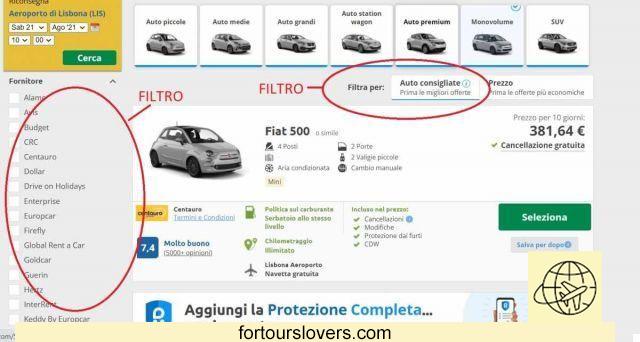
Below each car that will be shown to you find all the information you need: cancellation policies, fuel policies, available insurances (but you can always add more if you feel safer) and reviews.
Please read everything! Once you have selected your car, all you have to do is complete the rental through the wizard and voila, that's it!
2 - How to rent a car without a credit card
Even in Portugal it is possible to rent a car without a credit card.
Attention, this does not mean that you can go there, take the car, pay in cash and whoever has seen, has seen.
In fact, most suppliers will not rent you a car without a credit card, but almost all major cities have at least one company that will allow you to rent a car with a debit card.
When trying to rent a car without a credit card, it is important to know that the debit card (required) is different from the credit card. While these can be easily confused, debit cards are generally not accepted when picking up the rental car.
To rent a car in Portugal without a credit card you will need 3 things:
- A debit card (e.g. Visa Electron or Mastercard Debit)
- A valid driving license
- Enough money to cover the cost of your rental car
But how to book a car without a credit card?
Also here Rentalcars comes to meet you.
When you have entered your travel dates and you will be shown the screen with the available car options, scroll down the page until you see on the left the Debit Card or Debit Card filter (see image below).
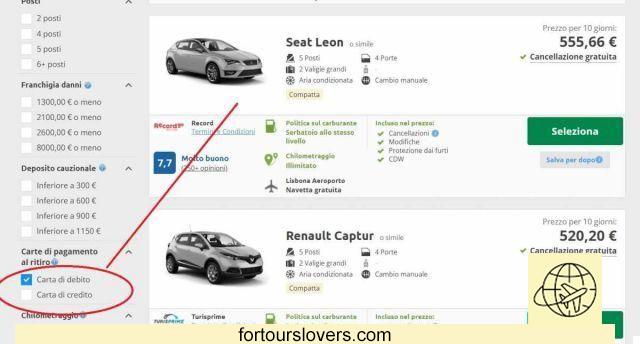
Select "Debit Card" and you will see that one thing happens: in the upper filter of the different car rentals there will no longer be all the companies, but only those with which you can book in this way.
At this point, select your car and proceed with the rental.
VAI a RENTALCARS
3 - Pay attention to the collection and return dates
This is one of the things we pay less attention to, but if you want to avoid nasty surprises you should pay attention to it: the dates and times of collection and return of the vehicle.
The cost of renting a car typically ranges from 24 hours to 24 hours. This means that if you pick up a car at 10:00 on day 1 and return it at 11:00 on day 2, you will end up paying for 2 days even if you actually only kept it an hour longer.
Avoid this by being careful when selecting pickup and delivery times.
There is another thing to watch out for: the opening hours of the offices if you decide to book your car away from the airport: many in fact close at 19 and some are closed on Saturday afternoons. So you may have paid and not have your car until the morning of the next day.
Sometimes it is easier to return (it depends on the rental companies). Often, even if the offices are closed, it is possible to park the car and leave the keys in a kind of box.
ATTENTION: Sometimes it is much cheaper to rent a car for a week than for 5 or 6 days. Try modifying your search and entering a week to see how much it would cost you, no one is stopping you from returning the car early!
4 - Return of the car at different points (drop-off)
There is another thing for which much more money often hangs without even realizing it: the drop off or the return of the vehicle to a place other than the collection point.
It means that if you take the rental car in one dealership, if you bring it back to another (even in the same city) the price of the car is higher. Sometimes much greater.
How to deal with this problem? Well the best thing is to plan a trip in such a way that you make a circle so you will start from one point, you will do your entire itinerary and return to leave the car in the same place you took it.
Also check the cost of public transport. If you have a rental near your hotel that is more expensive than a far one, consider how much it would cost you to get there to pick up your car.
If you are planning trips that include internal flights and therefore several airports, it may also be worthwhile to arrange two separate car rentals.
5 - Better a small car
The "mini" or "cheap" cars usually they are the cheapest to rent. Choose the smallest car that can carry all your luggage in the trunk (trunk). If you are more than two and will drive a lot, look for a compact or midsize car for better levels of comfort.
There are a lot of reasons why choose a small car. It costs less to rent, consumes less, finds parking more easily (which should not be underestimated at all) and generally if you are two there is enough space to be comfortable.
True, a large car is generally faster and more comfortable, but if you enjoy the ride like me, speed is not a problem (and then there are limits to be respected).
6 - Speed limits
This tip is valid regardless of where you rent a car in the world. Respecting the speed limits is important to avoid high fines and for your safety (and that of your travel companions).
Portugal has 3 categories of speed limits. On Portuguese motorways, which are the country's main motorways, the limit is usually 120km / h. On 2-lane motorways, the limit is less than 90 km / h. On urban roads within cities, the limit is normally 50 km / h.
7 - Gasoline is quite cheap
IFuel can be very expensive. Compared to us, petrol or diesel in Portugal costs much less.
At the time of writing the prices are as follows:
- petrol: approximately € 1,10 / liter,
- diesel: € 0,90 / liter,
- LPG: 0,60 euros / liter
8 - The motorways are beautiful, but you pay the toll!
This is also nothing new for us, but if you are used to traveling in Germany (where the motorways are free), Switzerland and Slovenia (where there is the "vignette") you may be surprised that in Portugal the motorways are paid as we do.
Something to know:
In Portugal you pay by electronic payment. In practice, the passage of vehicles is recorded thanks to the equipment present at the beginning of the lanes, and these roads are identified by the words "Electronic toll only"
When you rent your car, with a small supplement, however, you can take a kind of telepass, which here is called "Via Verde" which will allow you to pay tolls when returning the car or by reloading the card first.
That said, there are not only highways in Portugal, but other beautiful back roads as well. Less fast, that is undoubted, but much more panoramic.
In addition, the Portuguese do not like to pay motorway tolls so especially around the villages you may find traffic.
9 - Should you rent a car at the airport?
The main international airports of Portugal in Lisbon, Porto, Faro, Madeira and the Azores islands have on-site car rental companies.
Generally you have more choice and usually better deals with the rentals you find at the airport than the locations in the city.
That said, I would avoid driving in Lisbon and Porto if possible. The public transport systems in both cities, along with cheap taxis, make it unnecessary to have a car during your stay and are likely to be more of a headache than anything else.
Parking is problematic, one-way streets and signage can be confusing, and local drivers have little patience, especially at rush hour.
Other cities aren't that bad and if you have a GPS navigation system and accommodation with parking, having a car shouldn't be a problem and will give you the freedom to explore nearby locations as well.
My advice: plan to spend three days in Lisbon o Porto at the beginning / end of your trip without taking the car, then take public transport (or a taxi) to or from the airport when you pick up or drop off your rental car.
10 - Fuel policies
Another way to avoid extra costs is to check the rental company's fuel policies. That is to say full / full o full empty.
What this means means that when you pick up your car it will presumably have a full tank of fuel. Some companies ask you to return the car as you got it, i.e. with a full tank, others to return the car with an empty tank.
There are pros and cons in each of the two cases:
1 - full / full: you will have the stress of looking for a distributor before returning the car. If you fail, the company will ask you for the difference by charging you much more than the market price for gas. For example, when this happened to me, the company estimated that 5 liters of petrol were missing, charging me the one that was missing 2 euros per liter instead of 1,10.
2 - If instead you choose full / empty, you will inevitably give the car rental company free fuel because you don't want to risk running out of gas before returning the car.
However, the best thing is to opt for full / full, perhaps looking on maps for the nearest petrol station (within a radius of 10 km is fine) before returning the car: do not worry there is almost always a petrol station nearby!
Doing so in fact in the end you will only pay for the fuel you actually used!
PS: keep the receipt you never know!
11 - Young pilots
Although the driving age in Portugal is 18, many car rental companies require drivers to be over 21. This way, they avoid taking the risk often associated with younger and less experienced drivers.
Rental companies that do not have this requirement may still charge additional fees for younger drivers. For example, it is very common (in Portugal and elsewhere) that drivers under 25 have higher rental rates (usually ranging from € 6-10 per day!)
So, pay close attention to these requirements and make sure your rental car driver meets the minimum age. This way, you can avoid any sticky problems on your trip.
12 - Additional costs for the second driver
Generally adding an additional driver costs. The fare varies and is usually between € 7 and € 10.
Some car rental companies offer the second driver for free.
What you can do: try to understand in advance, depending on the trip and your needs if you will need a second driver. This obviously depends on the days, the km you decide to do and also on how you are.
If you decide you need it, evaluate the offers to get it for free. If you do not find, you can still do another thing: ask if it is possible to pay only for specific days, eg. if you rent a car for 7 days but you just need a different driver on 2 of them, you only pay for those two days there.
13 - Extra costs: Optional
When you rent the car the cost also depends on the options you decide to purchase, such as a GPS navigator or a child seat.
The rate for renting a sat nav directly from the rental company.
How much? The rate varies widely, but is typically around € 5-10 per day, with some companies charging up to € 200 of deposit on your credit card, which will be returned to you the day you return it.
Can you avoid it? Absolutely yes. There are a lot of Whatsapp free that you can use and with free roaming you don't have to worry about the internet connection if you already have a plan that includes it with the phone company.
You can for example use something like Google Maps o Waze on your phone in combination with an old-fashioned paper map. Another thing to consider is that some of the newer rental cars also have built-in satellite navigation units.
If you have to rely on a separate satellite navigator, consider bringing your own (just remember that EU maps may need to be added). Or consider purchasing a new one before your arrival.
Rental costs vary a lot but it is almost always cheaper to upgrade your own and, in some cases, even buy one if you are planning more than one trip!
To comply with EU legislation, children under the age of 12 or under 1,35m in height must use a child seat.
How much? The cost varies widely, but is typically around € 5-15 per day.
Having said that I NEVER recommend giving up security to save money, in fact the cost could really raise the rental price.
You can avoid this in two ways: the first is to bring your own, even if I don't recommend it because taking it on the plane as well as being a big pain in the ass, it could also have a cost.
The smartest choice is to buy one on site.
Prices vary, but already for less than 50 euros you could find in stores something like this seat from Foppapedretti which looks good and unlike the rented one, you take it home which could always come in handy!
In reality you can also find for much less! For instance this of the Safety First costs less than 15 euros!
If you rent a car for 7 days at a cost of 10 euros a day for the rental of the car seat, then it is worth going to look for one like this in the super and if ever then abandon it or give it in case you don't want to take it home.
14 - Check for damage and take pictures
One of the things that I ALWAYS recommend when it comes to renting a car is to check carefully both on collection and return for any damage.
When you collect your car, especially pay attention, together with the person who will rent it, for any scratches, defects and have them marked on the appropriate sheet. Not only do you also take photographs to have proven proof that that scratch when you picked up the car was already there!
Take
And do the same when returning the car to have proof that you have not made any scratches on the car during the rental, so in case someone tells you that you have to pay damages, you can prove that you have not been!
15 - Additional insurance
Like anywhere else in the world, Portugal also has various insurance options to choose from for your rental car.
The basic insurance is the one that covers accidents and theft. This is mandatory and is very important for safe travel.
However, car rental companies will normally try to sell you insurance upgrades with names like "plus" or "exclusive". These types of insurance cover things like third party damage, broken windows, flat tires, and more. However, they are usually very expensive.
Well, whether to do it or not, I can't be the one to tell you. This is because if I told you "don't do it" and then something happens, I don't want anyone to say: eh but the one from that blog there advised not to do it ...
What I can tell you is that no bad thing ever happened to me when I rented the car in Portugal. The roads are normally very good, the drivers respect the rules and the country is among the safest in the world.
It is up to you if you want to risk not being covered on certain things or whether to travel in total peace of mind.
So, if you take supplemental insurance, it will be your decision if you want more complete coverage to be more comfortable!
FIND LOW COST CARS
SUMMARY FAST ADVICE
1 - book early to save
2 - Check all the condizioni before renting the car
3 - Try to rent a car that has a full / full fuel policy
4 - Check the car before taking it over and if possible with the attendant (who will mark any damage and lines already present on the car on a sheet)
5 - To save money, try to have a driver over 25 years old
6 - When you leave it, check the car for damage with the attendant, if the attendant is not there take pictures




